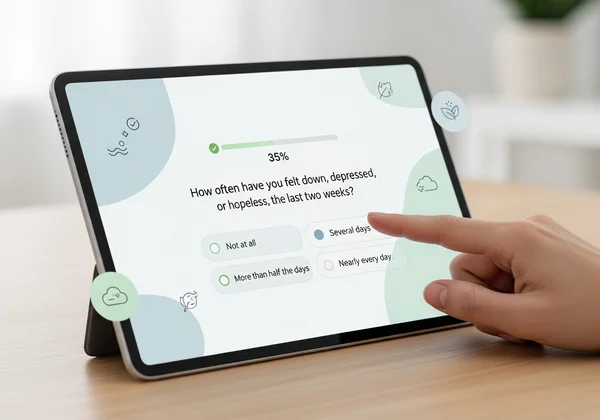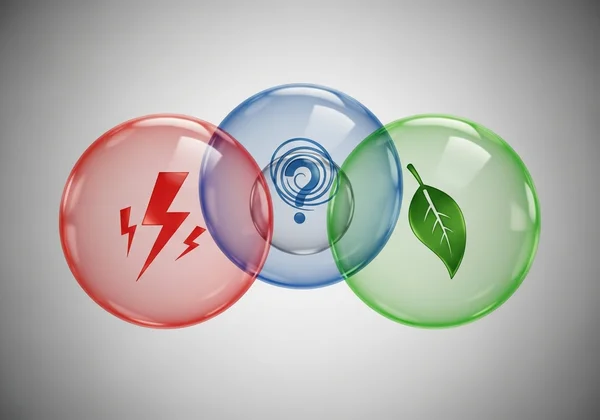Mental Health Test for Stress: Signs, Impact, and Effective Coping
July 27, 2025 | By Owen Buckley
That crushing feeling of being overwhelmed? It's something many of us know well. The constant pressure from work, school, or personal life can build up, leaving you feeling drained, irritable, and disconnected. If you're wondering how to manage these feelings, a great first step is understanding them through a stress test. But how to test mental health in a way that provides real clarity? This guide will help you understand what stress is, how to recognize its signs, and what you can do to manage it effectively.
Taking the first step towards understanding your emotional wellbeing is a sign of strength. For a clear, confidential, and immediate way to assess where you stand, consider taking a free mental health test. It’s a simple, science-based tool designed to empower you with knowledge.

Understanding Stress: What It Is & What It Isn't
Stress, in its simplest form, is your body's response to any kind of demand or threat. When you sense danger—whether it's real or imagined—the body's defenses kick into high gear in a rapid, automatic process known as the "fight-or-flight" reaction. This is your body's way of protecting you. In short bursts, stress can be positive, such as when it helps you avoid danger or meet a deadline.
However, when stress becomes chronic—meaning it's constant and you feel persistently overwhelmed—it can severely damage your health, mood, productivity, and relationships, as highlighted by the World Health Organization (WHO). It’s important to distinguish it from other mental health conditions to address it correctly. An online mental health assessment can provide a helpful starting point for differentiation.
Stress vs. Anxiety vs. Depression: Key Differences
While they often overlap, stress, anxiety, and depression are distinct conditions. Stress is typically caused by an external trigger, like a tight deadline or an argument. Once the trigger is gone, the stress usually subsides.
Anxiety, on the other hand, is characterized by persistent, excessive worries that don't go away even in the absence of a stressor. It’s an internal reaction. Depression involves a persistent low mood, a loss of interest in activities, and feelings of hopelessness that can make even simple tasks feel monumental. Understanding these nuances is key to seeking the right kind of support.

Common Triggers & Types of Stressors
Stressors are the events or conditions that cause stress. They are highly personal and can range from major life changes to the accumulation of daily hassles. Common stressors include:
- Work or School Pressure: Deadlines, heavy workloads, or difficult colleagues.
- Financial Problems: Debt, unexpected bills, or job insecurity.
- Relationship Issues: Conflicts with partners, family, or friends.
- Major Life Events: Moving, getting married, illness, or the loss of a loved one.
- Daily Hassles: Traffic jams, long queues, or minor disagreements.
Recognizing your personal stressors is a critical step in effective stress management.
Recognizing the Signs of Chronic Stress
When your nervous system is stuck in a state of overdrive, it can manifest in surprising ways. The signs of chronic stress can be physical, emotional, and behavioral. Paying attention to these warning signs is crucial for preventing long-term damage. If you recognize several of these signs in yourself, it might be time to check your stress levels.
Physical Symptoms: How Stress Impacts Your Body
Chronic stress can wreak havoc on your physical health. Your body may be sending you signals that it's under too much pressure. Common physical symptoms include:
- Headaches and muscle tension, especially in the neck and shoulders.
- Fatigue and difficulty sleeping (insomnia or oversleeping).
- Digestive issues like stomachaches, nausea, or changes in bowel habits.
- Increased heart rate and chest pain.
- A weakened immune system, leading to frequent colds or infections.
Emotional & Cognitive Signs: What Stress Does to Your Mind
Your mind bears a heavy burden under chronic stress. You might find it difficult to think clearly or regulate your emotions. These signs can be subtle but have a profound impact on your quality of life.
Look for signs like irritability, agitation, and moodiness. You might feel overwhelmed or a sense of losing control. Many people experience difficulty concentrating, memory problems, and constant worrying. This mental fog can make it hard to accomplish tasks and contribute to a cycle of feeling even more stressed.

Behavioral & Social Changes Due to Stress
Stress can also change how you act and interact with others. You might not even realize that your behaviors have shifted due to underlying pressure. These changes can strain relationships and isolate you when you need support the most.
Common behavioral shifts include changes in appetite (eating more or less), procrastination, and avoiding responsibilities. Some people turn to substances like alcohol or drugs to cope. Socially, you might withdraw from friends and family or find yourself getting into more frequent arguments.
Effective Coping Strategies for Stress Management
Adopting effective coping with stress strategies can help you regain control and build a more resilient mindset. It’s about creating a toolkit of techniques you can use both in the moment and for long-term wellbeing. Taking a confidential assessment can help you identify which areas need the most attention.
Immediate Stress Relief Techniques
When you feel stress spiking in the moment, you need quick, effective tools to calm your system down. These techniques can be done almost anywhere to provide immediate relief.
- Deep Breathing: Inhale slowly for four counts, hold for four counts, and exhale slowly for six counts. This activates the body's relaxation response.
- Mindful Grounding: Name five things you can see, four things you can feel, three things you can hear, two things you can smell, and one thing you can taste.
- Quick Movement: A short walk, stretching, or even just shaking out your limbs can release physical tension.
Building Long-Term Resilience & Sustained Wellbeing
For lasting stress management, you need to build healthy habits into your daily life. These lifestyle changes create a strong foundation for mental and emotional resilience.
Focus on regular physical activity, which is a powerful stress reducer. Ensure you are getting 7-9 hours of quality sleep per night. A balanced diet rich in nutrients supports both brain and body function. Most importantly, make time for hobbies and activities that bring you joy and relaxation. Connecting with supportive friends and family is also vital for your mental wellbeing.

When to Seek Professional Support for Stress
Self-help strategies are incredibly powerful, but sometimes they aren't enough. It's a sign of strength, not weakness, to know when to seek professional help. If stress is significantly interfering with your ability to work, study, or maintain relationships, it's time to talk to someone.
If you are using unhealthy coping mechanisms like substance abuse, or if you are experiencing symptoms of anxiety or depression, a mental health professional can provide guidance and treatment. A preliminary mental health screening can serve as a useful document to discuss with a doctor or therapist.
Empower Yourself: Take the Next Step Towards Stress Relief
Managing stress isn't about avoiding it, but about transforming how you respond. By understanding its signs, pinpointing your triggers, and equipping yourself with effective coping strategies, you're not just surviving – you're building a stronger, more resilient self. You hold the key to reshaping your relationship with stress.
Take the first, most important step today. Gain a clearer understanding of your emotional landscape with a free, confidential, and science-based stress test. Visit our site to start your assessment now and empower yourself with the insights you need to thrive.
Frequently Asked Questions About Stress & Wellbeing
How can I effectively test my stress levels?
A great way to get an objective measure of your stress is through a structured screening tool like our online stress test, which uses scientifically validated questions to assess your symptoms. It provides a score and personalized feedback, giving you a clear, private, and immediate snapshot of your current stress levels.
What are 5 common signs of high stress?
Five common signs include: 1) persistent headaches or muscle tension; 2) chronic fatigue and sleep problems; 3) increased irritability or mood swings; 4) difficulty concentrating or "mental fog"; and 5) withdrawing from social activities you once enjoyed. Recognizing these signs is the first step toward managing them.
Can an online stress test replace a doctor's diagnosis?
No, an online test is a screening tool, not a diagnostic one. It is designed for educational purposes to help you understand your emotional state and identify potential areas of concern. While a mental health diagnosis test online provides valuable insights, it cannot replace a comprehensive evaluation by a qualified healthcare professional. It is, however, an excellent starting point for a conversation with a doctor.
When should I seek professional help for stress?
You should seek professional help if stress is causing significant distress or impairment in your daily life, if self-help strategies aren't providing relief, or if you're turning to unhealthy coping mechanisms. If your stress is accompanied by persistent feelings of hopelessness or thoughts of harming yourself, it's crucial to seek help immediately.
Are stress management techniques really effective?
Absolutely. Decades of research show that techniques like mindfulness, exercise, proper sleep, and cognitive reframing are highly effective at reducing the physiological and psychological impact of stress. The key is consistency. Finding the right combination of strategies for you and practicing them regularly can lead to significant improvements in your overall wellbeing.
Disclaimer: This article is for informational purposes only and does not constitute medical advice. The tools and information provided on this platform are for screening purposes and are not a substitute for professional diagnosis or treatment. Please consult a qualified healthcare professional with any questions or concerns about your health.
If you are in crisis or believe you may have an emergency, please use your local emergency services (e.g., 911) or contact a crisis hotline.